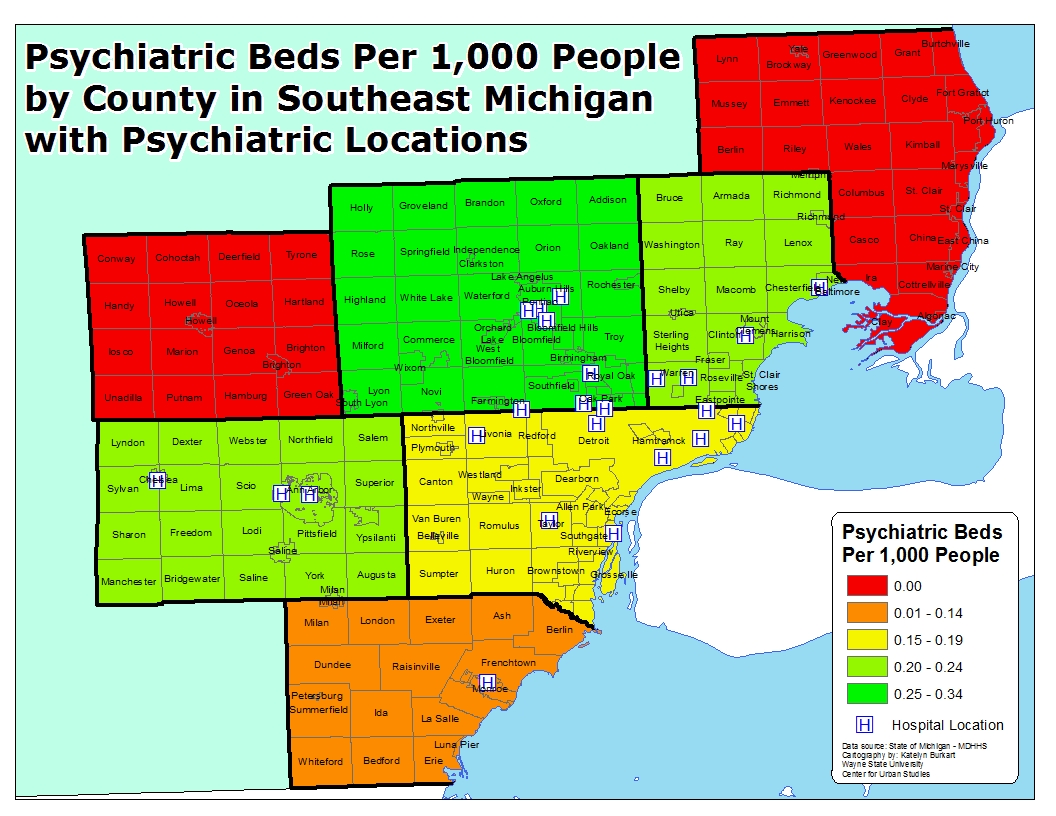The number of adult psychiatric beds available in the 1950s (3.4 per 1,000 people) has greatly decreased over the last 60 years in part due to the increased availability of drugs, the poor conditions of early psychiatric hospitals and the shift toward deinstitutionalization, according to Henry Ford Macomb Hospital Medical Director of Quality and Clinical Integration Vikram Eddy. In Southeastern Michigan such a lack of access to licensed adult psychiatric beds exists. According to data from the Michigan Department of Health and Human Services, access to psychiatric hospital beds in Southeastern Michigan is non-existent in some counties (Livingston and St. Clair counties) and low in others.
Of the seven counties in Southeastern Michigan, Oakland County had the highest adult psychiatric hospital bed access per 1,000 residents at 0.34. In comparison, as discussed in our last post, hospital bed access in Oakland County was 3.4 per 1,000 residents. In 2016, according to the Michigan Department of Health and Human Services, there were 453 licensed psychiatric beds at nine different hospitals in Oakland County; Havenwyck Hospital in Auburn Hills had the most at 153.
In Wayne County there was a total of 317 licensed adult psychiatric hospital beds at eight different hospitals; the psychiatric hospital bed access per 1,000 residents was 0.17. BCA Stonecrest Center in Detroit had the highest number of psychiatric beds in the county at 88.
Macomb and Washtenaw counties also had access near 0.2 adult psychiatric beds per 1,000 residents in 2016. The adult psychiatric hospital bed access in Macomb and Washtenaw counties was 0.23 per 1,000 residents. In total, there were 198 licensed adult psychiatric beds in Macomb County and 81 in Washtenaw County. In our last post Washtenaw County was highlighted for the having the highest number of licensed hospital beds per 1,000 residents at a rate of 4.6. The number of licensed hospitals beds at the University of Michigan Health Systems largely contributed to that rate; there are 1,000 licensed hospital beds at the University of Michigan and 27 licensed adult psychiatric hospital beds.
All of the adult licensed psychiatric beds discussed in this post are housed in private hospitals. Statewide, there are five public health hospitals that cater to those with mental illness; only one of these hospitals is in Southeastern Michigan (Walter B. Reuther). This institution was not included in this post because of the state of Michigan has different licensing requirements and therefore does not list it in its psychiatric hospital bed access document, which is produced by the Michigan Department of Health and Human Services.
Arguments have been made nationally and locally that states such as Michigan should move away from their decentralized and deinstitutionalized mental health approach and increase the number of state run mental health facilities. Currently, community based mental health services are administered through 46 community mental health agencies, all of which have faced state aid cuts and remain independent of one another. In our work in Detroit’s neighborhoods we regularly hear of men and women in dire need of these services. Because of this we see a need for increases in community-based services and hospital-based services, if we are to meet the needs of the state’s citizens.
